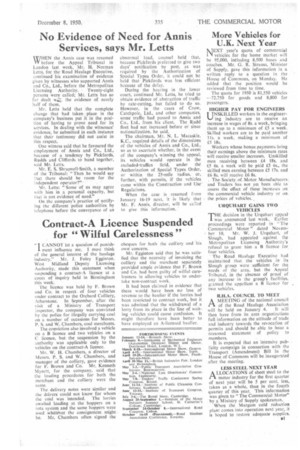Contract-A Licence Suspended for "Wilful Carelessness"
Page 35

If you've noticed an error in this article please click here to report it so we can fix it.
" I CANNOT let a question of punishmerit influence me. I must think of the general interest of the haulage industry." Mr. J. Foley Egginton. West Midland Deputy Licensing Authority, made this statement when suspending a contract-A licence at a court of inquiry held in Birmingham this week.
The licence was held by F. Brown and Co. in respect of four vehicles under contract to the Orchard Colliery, Atherstone. In September, after the
kii, of a Ministry of Transport :nspector, the company was convicted by the police for illegally carrying coal on a number of occasions for Messrs. P. S. and W. Chambers, coal merchants. . The conviction also involved a vehicle on a B licence and two vehicles on a
C licence, butthe suspension by the authority was applicable only to the vehicles on the contract-A licence.
Mr. W. H. Chambers, a director of Messrs. P. S. and W. Chambers, and manager of the colliery, gave evidence for F. Brown and Co. Mr. Kenneth Mynett, for the company, said that the loading procedures for both the merchant and the colliery were the same.
The delivery notes were similar and the drivers could not know for whom the coal was intended. The lorries awaited loading at the hoppers on a rota system and the same hoppers were used whatever the consignment might be. Mr. Chambers often signed the cheques for both the colliery and his own concern.
Mr. Egginton said that he was satisfied that the necessity of invoicing the colliery and the merchant separately provided ample evidence that F. Brown and Co. had been guilty of wilful carelessness in allowing vehicles to undertake non-contract work.
It had been claimed in evidence that there would have been no loss of revenue to the haulier if the lorries had been restricted to contract work, but it was admitted that the withdrawal of a lorry from its place in the line of waiting vehicles could cause confusion. It might therefore have been better to have employed an A-licensed haulier.




























































































